20+ SAMPLE Vendor Application Forms
-
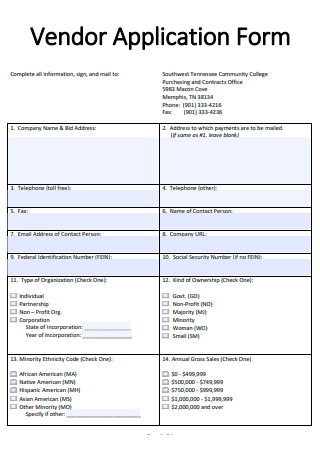
Vendor Application Form Template
download now -
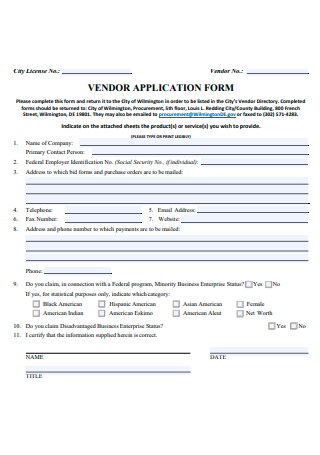
Basic Vendor Application Form
download now -
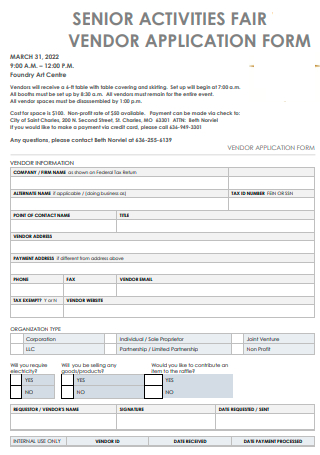
Senior Activities Fair Vendor Application Form
download now -
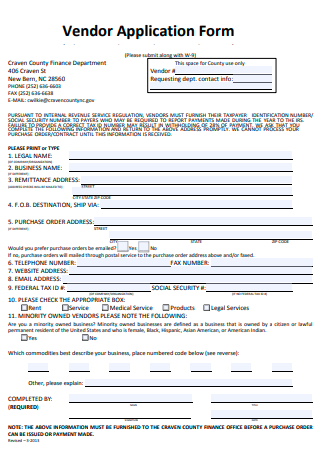
Vendor Application Form Example
download now -
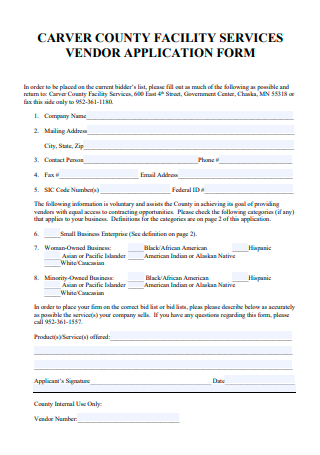
Facility Services Vendor Application Form
download now -
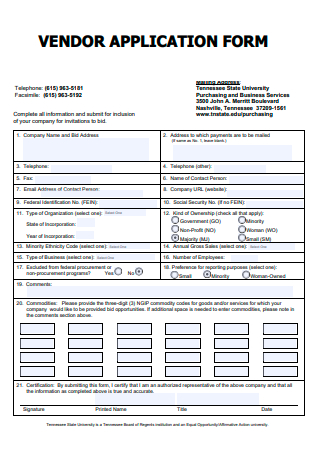
Formal Vendor Application Form
download now -
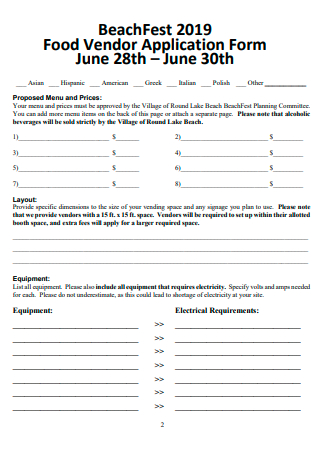
Food Vendor Application Form
download now -
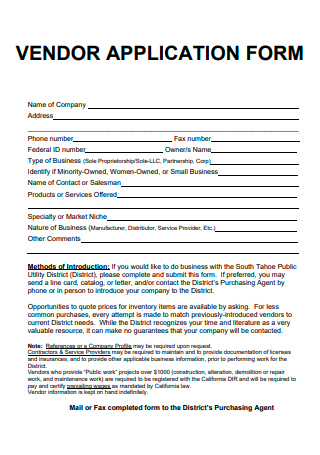
Vendor Application Form in PDF
download now -
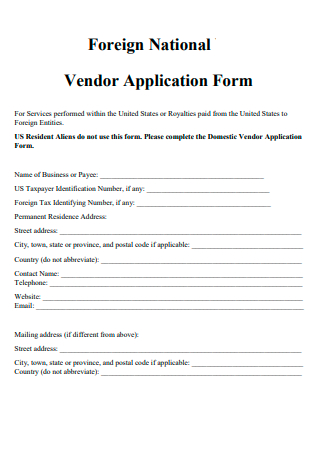
Foreign National Vendor Application Form
download now -
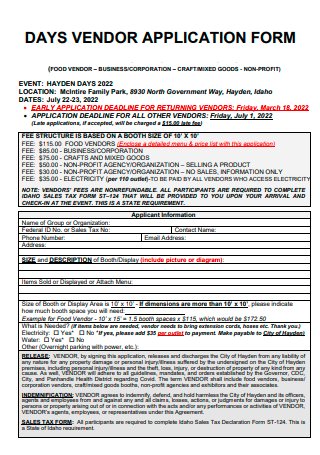
Days Vendor Application Form
download now -
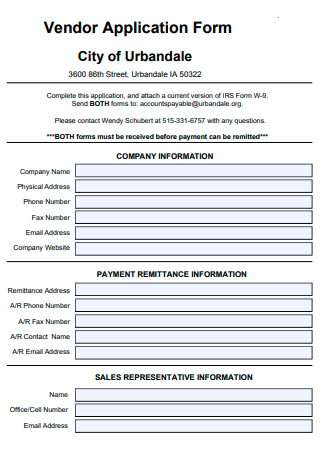
Printable Vendor Application Form
download now -
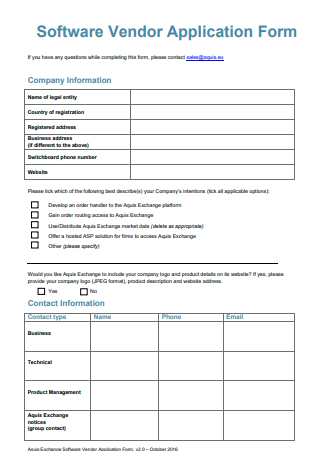
Software Vendor Application Form
download now -
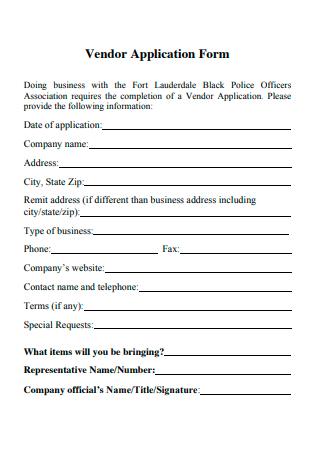
Simple Vendor Application Form
download now -
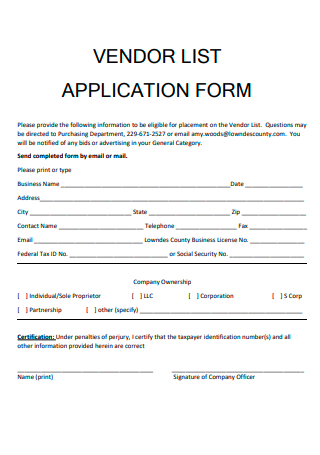
Vendor List Application Form
download now -
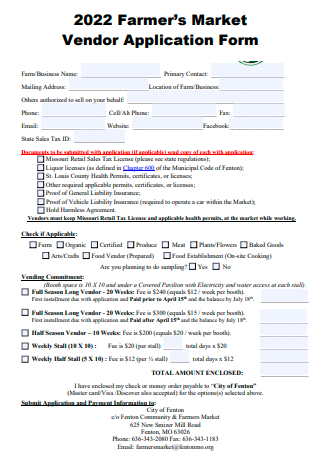
Farmers Market Vendor Application Form
download now -
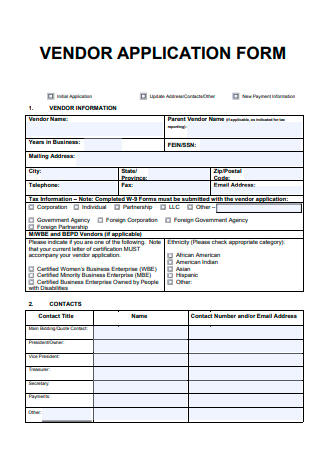
Vendor Application Form Format
download now -
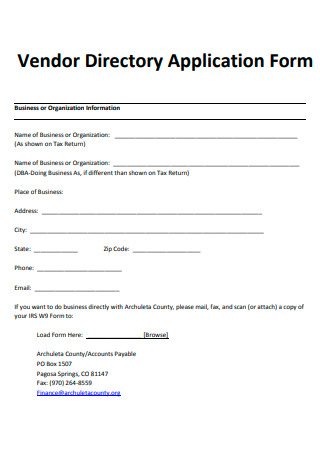
Vendor Directory Application Form
download now -
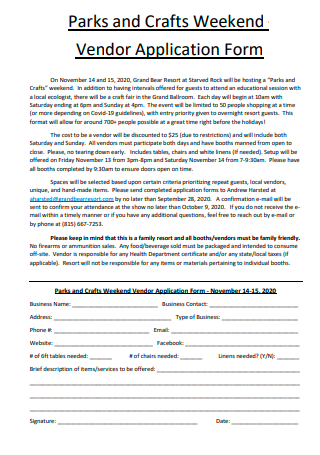
Parks and Crafts Weekend Vendor Application Form
download now -
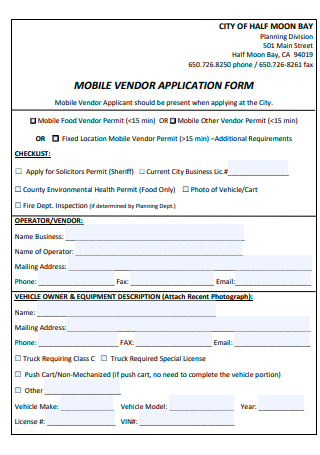
Mobile Vendor Application Form
download now -
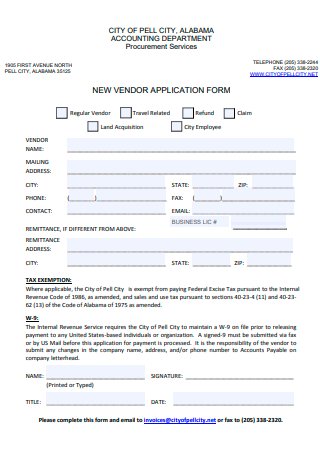
New Vendor Application Form
download now -
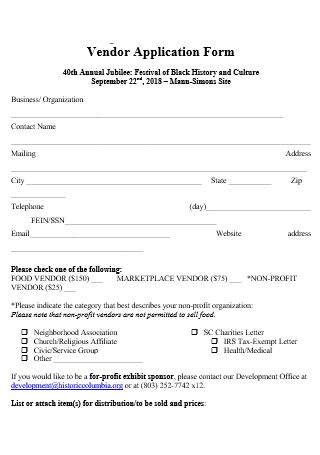
Vendor Application Form in DOC
download now
FREE Vendor Application Form s to Download
20+ SAMPLE Vendor Application Forms
What Are Vendor Application Forms?
Tips for Being a Vendor at Events
Different Types of Vendors
How to Write Vendor Application Forms
FAQs
What are accounts payable?
What is the importance of a vendor and supplier relationship?
What is a vendor profile?
What Are Vendor Application Forms?
When a vendor applies to offer products or services at an event, festival, or fair, they must fill out the vendor application forms. Vendor identification, contact information, tax professional details, stall preferences, payment details if applicable and they have the choice, and specifics on their products or services are all included on the form. You can read a comprehensive guide down below to see the contents of the vendor application letter. Alternatively, you can utilize the free vendor application form template provided so you can save time and effort as opposed to starting from scratch.
Tips for Being a Vendor at Events
In 2020, approximately 4.3 million business applications were filed, a 24 percent increase over 2019 and a 51 percent increase over the 2010-2019 average according to Nerd Wallet. With new businesses opening all around, this curated list may be useful to upcoming store owners or vendors aspiring to join events in need of their offers. But even seasoned vendors may need these sets of tips to remind them how to make the most out of their presence in an event to not only maximize their earnings but also gain positive recognition.
Different Types of Vendors
According to Indeed, there are several sorts of suppliers who play various roles in the supply chain process. The types of suppliers and their duties are listed below in this curated list. You can learn more about the types of vendors that you can invest further in or change direction if the current one you are in does not work out.
How to Write Vendor Application Forms
You have officially reached the part of preparing an application for vendor registration, this can apply for various purposes, events being one of them. As you may have read above, there are important steps to follow to ensure you have all the necessary information present in the document itself. But if you are pressed for time, you can alternatively utilize the vendor registration form format to save you the effort rather than starting from scratch. Keep in mind that since you are using a pre-made application, some things may not directly apply to the situation you are writing for.
1. Indicate Official Business Name and Details
Inquire the supplier about the name of their business and the proprietor. If they are coming with other people, let them list down the names of everybody on their team. Because of the prevailing COVID-19 circumstances, you may also want to ask them to upload their vaccination or COVID-free certificates. This should be followed directly by the basic contact information where your company is situated. Each vendor should at the very least include an email address, a phone number, and a backup phone number. You may also include a section for their Workplace or home address.
2. Clarify Business Type
This is where you, as the seller, explain what kinds of commodities, products, or services you provide. This information is critical since you don’t want to create an event with only one sort of food and a scarcity of others. Before you put out a call for candidates, you should first figure out how many spaces you have and how many stations you want to allocate to each sort of cuisine. In terms of the business description, you must specify the type of market you frequently target, the price range you present, and the amount of personnel you have recruited.
3. Present Gross Annual Sales
This is a field that many event organizers neglect, despite its importance. A vendor’s sales volume reveals a lot about them. For example, the more a vendor’s gross Annual revenue, the greater the number of individuals they can service. You wouldn’t want to bring on a vendor who is accustomed to attending to fifty people per day to an event with thousands of guests. Gross sales enable a company to determine its overall revenue earned during a certain time period. It is employed in the computation of useful profitability measures such as the gross margin ratio.
4. Present Available Licenses
It is your responsibility as an organizer to verify that your event has the necessary permissions. Even if only one vendor is in breach, licensing authorities normally go after the planners. As a result, double-check to confirm that each vendor has all of the necessary permissions. There are several permits for outdoor events that you and your suppliers may require.
5. Payment Options
This feature is critical in contracts where suppliers pay you depending on the number of sales they produce. In the digital world, there are various options available. You can come upon an agreement to go through the transaction through cash, checks, debit cards, credit cards, mobile payments, or electronic Bank transfers. As long as it works for both parties, then there is much less hassle in dealing with this part.
6. Attach Terms and Conditions
As with any contract, the conditions of the agreement should be clearly stated. Before submitting their applications, request that the suppliers read them and consent to them. One of the factors you will need to consider is the amount of space you will be needing, if your booth would be self furniture, you definitely can’t expect to place some in a tight area. At the same time, you have to be sure there is a cover over the items you are selling. You can’t leave consumables out in the open otherwise risk contamination. Lastly, consider the inclusion of promoting your social media accounts to invite customers to visit it.
FAQs
What are accounts payable?
- Investopedia defines accounts payable are monies owed to vendors or suppliers for products or services not yet paid for. The accounts payable balance on the company’s balance sheet is the total of all outstanding sums owing to vendors. Accounts Payable will pay the invoice and close the encumbrance if the goods or services have been received and the price and quantity match. Accrued costs like logistics, licensing, leasing, raw material purchase, and job work are examples of accounts payable. Accounts payable represent the amount that has still to be paid to the linked individual in order to complete the transaction.
What is the importance of a vendor and supplier relationship?
The network’s goal is to function effectively together to simplify the movement and transfer of goods and services from raw material extraction to ultimate consumer usage. Establishing and sustaining strong vendor connections is critical for customer service, cost-efficiency, quality, and market growth. Vendors, as corporate allies, can play a critical role in an organization’s success or failure. Organizations should attempt to cultivate vendor relationships in the same way that they cultivate consumer loyalty. Having a good connection with a supplier who is interested in your company may be useful in a variety of ways.
What is a vendor profile?
A vendor profile is a reference document that sourcing experts use to categorize critical vendor information. The questionnaire is sent by procurement specialists, and suppliers fill it. Consider these profiles to be a digitized, comprehensive entry. Procurement professionals may be more strategic, efficient, and successful by using vendor profiles. Furthermore, profiles promote visibility, verify correctness, and save time for Suppliers. In the end, everyone wins from a more efficient and straightforward request for the proposal process.
Reaching the end of this article indicates you are ready to begin writing out the document requested by the event organizer or the company that would be seeing your offers. Keep in mind that you will need to double-check the content you are placing otherwise you will go through rushed revisions or end up in a misunderstanding with the other party. To avoid an unlikely scenario, use the sample available in this article.
